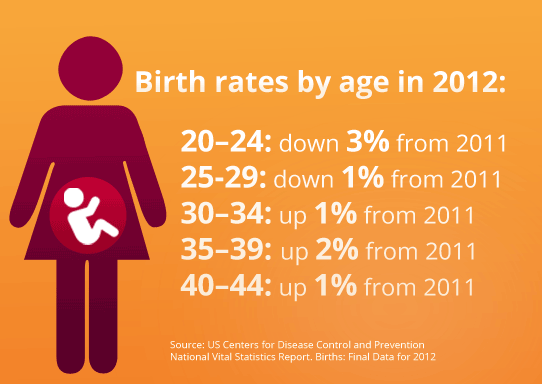“You're 22 and having a baby? Wow, that's young.”
“You're having a baby now? At 32? You're at high risk.”
It seems like women can't win when it comes to hitting that elusive best age to get pregnant. But, is there such a thing?
Birth rates declined for women in their 20s and increased for women 30 to 44 years old in 2012.

Source: US Centers for Disease Control and Prevention National Vital Statistics Report. Births: Final Data for 2012
No matter how old you are, health and nutrition are the foundation for a healthy pregnancy. The healthier you are when you get pregnant, the more likely it is that you will stay healthy during pregnancy. And if you have a health condition, the risk goes up. This is especially true if you're going into your pregnancy with a chronic condition, like obesity, diabetes or high blood pressure.
But here are some specific things to consider based on your age.
In Your 20s
The assumption is: Younger is better.
For most women, this is true. It's much easier to get pregnant in your 20s and, as a bonus, if you're a 20-something, you probably remember how to rally and stay up all night (which your baby will probably require you to do).
Your youthful energy can be a real asset as you go from pregnancy to new mom.
Financially, it could be a harder time to have kids. Women's average pay peaks at age 39, according to a January 2014 study from PayScale.com. So, it's likely that during your 20s you're making less than you will in a few years.
That said, some people argue that taking the time off in your 20s when you might be lower on the career totem pole is actually easier. There is not right or wrong answer, but it's something to consider based on your industry and ambitions.
In Your 30s
If you're in your 30s and preparing to have a baby, you have probably heard a number of people say, “Well, you better get moving!”
It's true: Getting pregnant does get harder as we age. Every month, a healthy, fertile 30-year-old woman has a 20% chance of getting pregnant, and this number continues to shrink over time, reaching 5% once you hit 40, according to The American Society for Reproductive Medicine.
If you are a pregnant 30-something, you will probably be more closely monitored than a woman in her 20s.
It's likely that your doctor will recommend genetic testing, including an amniocentesis, a test used to diagnose Down syndrome and other chromosomal abnormalities.
Ask your doctor if you'll need more frequent prenatal visits, especially as you near your due date.
One challenge women in their 30s (and 40s) face is that having a baby is a massive lifestyle change. If you are someone who has focused on work and is used to a very scheduled life, all that may have to go out the window - at least in the beginning.
The good news is that many women in their 30s have their health in order. You've probably ditched the bad habits of your college years and graduated from all-nighters to nights in.
In Your 40s
The honest to goodness truth is that preparing to have a baby in your 40s is riskier than in your younger years. By 40, the chance that you'll get pregnant drops to 5% per menstrual cycle, according to The American Society for Reproductive Medicine.
Fewer than 5 out of every 100 women in their 40s may get pregnant each month.

Source: The American Society for Reproductive Medicine.
Women over 40 also have a higher risk of gestational diabetes, according to an August 2012 study in the Journal of Maternal-Fetal and Neonatal Medicine.
Your risk of having a baby with a chromosome defect, such as Down syndrome, also increases. For women over 40, the risk is 1 in 30. For comparison, a 25-year-old woman's risk is 1 in 1,250, according to the March of Dimes.
Women over 40 also have a slightly higher risk of preeclampsia, a condition that causes high blood pressure during pregnancy, according to the Preeclampsia Foundation.
Pregnant women in their 40s should also be more aware of wear and tear on their bodies. For example, as we age, we tend to have more pelvic misalignment, meaning the pelvis tilts to one side. This can decrease flexibility and cause discomfort. But, massage therapy and chiropractic work can do wonders for your body—and your mind.
Older first-time moms might experience anxiety about being behind the curve. Many of your friends may have had kids 10 or 15 years earlier, so you may be worried about connecting with other new moms.
Postpartum support from a doula or parenting group can be really important for new moms in their 40s.
The great news for older moms is that you may have more financial resources to help you get the support you need.
And, the Best Age for Pregnancy Is...
Medically, your 20s are the optimal time to get pregnant.
But, despite the fact that some things are just easier when you're younger, the truth is, the best time for pregnancy also depends on where your health is and what is happening in your personal life.
Talk to your doctor about your baby plans and see which risks are more important to watch out for based on your age and health status.
$webqFacilityNumber
Need a Physician?